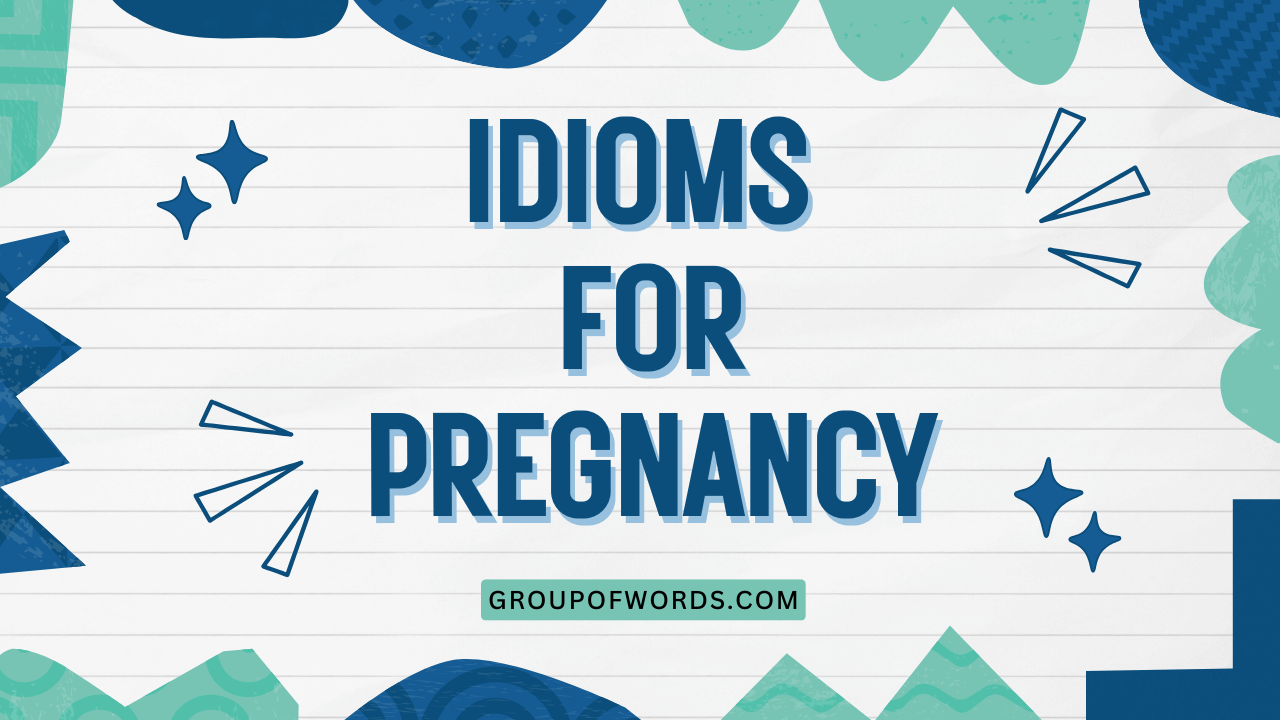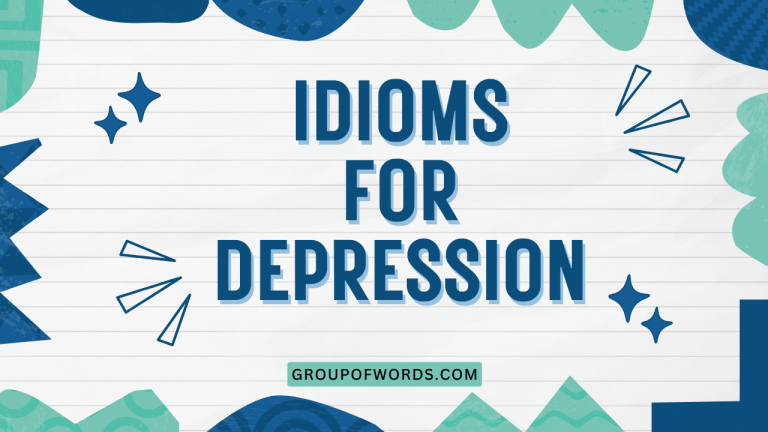Idioms for Pregnancy: A Comprehensive Guide
Pregnancy is a life-changing experience filled with unique terminology and expressions. Understanding idioms related to pregnancy enhances your comprehension of English, particularly in informal and conversational contexts.
This article explores common idioms associated with pregnancy, providing definitions, examples, usage rules, and practice exercises. Whether you’re an English language learner, a healthcare professional, or simply curious about pregnancy-related expressions, this guide will equip you with the knowledge to confidently navigate this linguistic landscape.
Pregnancy idioms offer a colorful and often humorous way to describe the various stages, symptoms, and emotions associated with expecting a child. Mastering these idioms enriches your vocabulary and improves your ability to understand and participate in conversations about pregnancy in English-speaking environments.
Table of Contents
- Definition of Pregnancy Idioms
- Structural Breakdown
- Types or Categories of Pregnancy Idioms
- Examples of Pregnancy Idioms
- Usage Rules
- Common Mistakes
- Practice Exercises
- Advanced Topics
- FAQ
- Conclusion
Definition of Pregnancy Idioms
Idioms are expressions whose meanings cannot be understood from the literal meanings of the individual words. Pregnancy idioms are specific phrases or expressions used to describe pregnancy, childbirth, and related experiences.
These idioms often use figurative language to convey complex emotions, physical changes, and social situations associated with expecting a child.
Classification: Pregnancy idioms can be classified based on the aspect of pregnancy they describe, such as the stage of pregnancy, physical symptoms, emotional states, or preparations for the baby. They can also be classified by their level of formality and the context in which they are typically used. Some idioms are more common in spoken English, while others might appear in written articles or books.
Function: The function of pregnancy idioms is to provide a more colorful and expressive way to communicate about pregnancy. They can add humor, empathy, or emphasis to a conversation. Using idioms effectively demonstrates a strong command of the English language and an understanding of cultural nuances.
Contexts: Pregnancy idioms are commonly used in various contexts, including:
- Casual conversations among friends and family
- Medical consultations (though often avoided by medical professionals)
- Parenting blogs and forums
- Books and articles about pregnancy and childbirth
- Television shows and movies featuring pregnant characters
Structural Breakdown
Pregnancy idioms, like all idioms, do not follow standard grammatical rules in terms of literal meaning. Their structure is fixed, meaning the words cannot be changed or rearranged without altering or losing the idiom’s intended meaning.
Understanding the structural elements of idioms involves recognizing the specific words and their arrangement within the phrase.
Fixed Structure: Idioms have a fixed structure, meaning you cannot change the words or their order. For example, you can’t say “bun in the oven little” and expect it to have the same meaning as “a bun in the oven.”
Figurative Language: Idioms often use metaphors, similes, or other figures of speech to convey their meaning. For example, “expecting” uses the literal meaning of anticipating something, but in the context of pregnancy, it means carrying a child.
Implied Meaning: The meaning of an idiom is not explicitly stated but rather implied. Listeners or readers must understand the cultural context and figurative language to interpret the intended meaning.
Types or Categories of Pregnancy Idioms
Pregnancy idioms can be categorized based on the specific aspect of pregnancy they relate to. Here are some common categories:
1. Announcing Pregnancy
These idioms are used when revealing the news of a pregnancy.
2. Stages of Pregnancy
These idioms describe the different phases of pregnancy, from early stages to the final weeks.
3. Physical Symptoms
These idioms refer to the physical changes and discomforts experienced during pregnancy.
4. Emotional States
These idioms express the various emotions, such as joy, anxiety, and anticipation, associated with pregnancy.
5. Preparations for the Baby
These idioms relate to preparing for the baby’s arrival, such as decorating the nursery and buying baby supplies.
6. Childbirth
These idioms describe the process of giving birth.
Examples of Pregnancy Idioms
This section provides a comprehensive list of pregnancy idioms, categorized by the aspect of pregnancy they describe. Each idiom is accompanied by its definition and example sentences to illustrate its usage.
Table 1: Idioms for Announcing Pregnancy
The following table presents idioms commonly used to announce a pregnancy. Each entry includes the idiom, its definition, and several example sentences demonstrating its use in context.
| Idiom | Definition | Example Sentences |
|---|---|---|
| A bun in the oven | Pregnant. | 1. She has a bun in the oven. 2. They’re expecting because there’s a bun in the oven. 3. I think Sarah has a bun in the oven; she’s been looking queasy lately. 4. We’re excited to announce that we have a bun in the oven! 5. After trying for years, they finally have a bun in the oven. |
| Expecting | Pregnant. | 1. They are expecting a baby in July. 2. She is expecting her first child. 3. We are expecting twins! 4. Are you expecting? You’re glowing! 5. The couple is expecting and couldn’t be happier. |
| With child | Pregnant. (More formal/old-fashioned) | 1. She is with child and due in the spring. 2. The queen was with child when she ascended the throne. 3. In the olden days, they would say a woman was “with child.” 4. Mary is with child; we should throw her a baby shower. 5. The doctor confirmed that she is with child. |
| In the family way | Pregnant. (Old-fashioned) | 1. She’s in the family way, so we need to be extra supportive. 2. Back in the day, they would say she’s in the family way. 3. I suspect she’s in the family way because of her recent cravings. 4. They announced that she is in the family way at the dinner. 5. Being in the family way is a beautiful experience. |
| Knocked up | Pregnant. (Informal and sometimes considered offensive) | 1. She got knocked up unexpectedly. 2. He found out his girlfriend got knocked up. 3. Some people might find it rude to say someone got knocked up. 4. I heard she got knocked up, but I’m not sure if it’s true. 5. Please be careful when using the phrase “knocked up.” |
| Preggers | Pregnant. (Informal) | 1. She’s preggers! 2. I’m pretty sure she’s preggers. 3. Are you preggers? You look radiant. 4. She announced on social media that she’s preggers. 5. Being preggers is an exciting time. |
| Up the duff | Pregnant. (British slang, informal) | 1. She’s up the duff, apparently. 2. I think she’s up the duff, but she hasn’t confirmed it. 3. They say she’s up the duff and delighted about it. 4. Being up the duff is a big change in life. 5. She’s up the duff, so everyone is pitching in to help. |
| Baking a cake | Pregnant. (Informal, humorous) | 1. She’s baking a cake that will be ready in nine months. 2. We’re baking a cake and can’t wait to share it with you. 3. She joked that she’s baking a cake in her tummy. 4. Baking a cake takes a lot of patience. 5. I’m baking a cake, so I’m avoiding alcohol. |
| Eating for two | Pregnant and eating more than usual. | 1. She’s eating for two now that she’s pregnant. 2. Don’t mind her; she’s eating for two! 3. Since she’s eating for two, she always has snacks with her. 4. Eating for two doesn’t mean you should double your portions. 5. When you’re eating for two, make sure it’s healthy food. |
| In a delicate condition | Pregnant. (Euphemistic, old-fashioned) | 1. She’s in a delicate condition and needs extra care. 2. Back then, they said she was in a delicate condition. 3. Being in a delicate condition requires rest and proper nutrition. 4. She’s in a delicate condition, so let’s be mindful of her needs. 5. They announced that she’s in a delicate condition. |
| About to pop | Very pregnant and close to giving birth. | 1. She’s about to pop any day now! 2. I feel like I’m about to pop! 3. She’s so big; she looks like she’s about to pop. 4. Being about to pop is both exciting and nerve-wracking. 5. She’s about to pop, so we’re on high alert. |
| Having a little one on the way | Expecting a baby. | 1. They’re having a little one on the way! 2. We’re having a little one on the way and are over the moon. 3. She announced they’re having a little one on the way. 4. Having a little one on the way is a huge responsibility. 5. They’re having a little one on the way, so they’re renovating the house. |
| Blowing up like a balloon | Gaining weight rapidly during pregnancy. (Informal) | 1. She feels like she’s blowing up like a balloon. 2. I’m blowing up like a balloon, but it’s all for a good cause. 3. Some women feel like they’re blowing up like a balloon during pregnancy. 4. Blowing up like a balloon is a common feeling. 5. She joked that she’s blowing up like a balloon but loves it. |
| Glow | The radiant appearance some pregnant women have. | 1. She has a pregnancy glow about her. 2. Everyone says I have a glow now that I’m pregnant. 3. The pregnancy glow is a wonderful thing. 4. Her skin has a beautiful glow. 5. They noticed her pregnancy glow immediately. |
| Blessed | Feeling fortunate to be pregnant. | 1. She feels so blessed to be pregnant. 2. We are blessed to be expecting our first child. 3. They feel incredibly blessed. 4. Being pregnant makes her feel blessed. 5. They announced they are blessed with a new addition. |
| In full bloom | Looking healthy and radiant during pregnancy. | 1. She’s in full bloom during her second trimester. 2. Pregnancy suits her; she’s in full bloom. 3. Being in full bloom is a beautiful sight. 4. They say she’s in full bloom. 5. Everyone noticed how she’s in full bloom. |
| A new chapter | Starting a new phase of life with a baby. | 1. This pregnancy marks a new chapter in their lives. 2. They’re excited to start a new chapter. 3. Having a baby is a new chapter. 4. This new chapter is filled with joy and challenges. 5. She’s embracing this new chapter. |
| With a little surprise | Pregnant. (Informal) | 1. They’re with a little surprise on the way. 2. We’re with a little surprise and couldn’t be happier. 3. She announced they’re with a little surprise. 4. They’re with a little surprise, so they’re planning ahead. 5. Having a little surprise is exciting. |
| A plus one | Expecting an additional family member. | 1. They’re expecting a plus one soon. 2. We’re adding a plus one to the family. 3. She announced they’re expecting a plus one. 4. A plus one is on the way! 5. They’re preparing for their plus one. |
| Expecting a visitor | Expecting a baby. (Humorous) | 1. They’re expecting a visitor in a few months. 2. We’re expecting a visitor and are so excited. 3. She announced they’re expecting a visitor. 4. Preparing for the visitor is a lot of work. 5. They’re excited about their visitor. |
Table 2: Idioms Describing Physical Symptoms of Pregnancy
The following table illustrates idioms used to describe the physical symptoms often experienced during pregnancy.
| Idiom | Definition | Example Sentences |
|---|---|---|
| Morning sickness | Nausea and vomiting during pregnancy, not necessarily only in the morning. | 1. She’s been suffering from terrible morning sickness. 2. Morning sickness hit her hard in the first trimester. 3. Is there anything that helps with morning sickness? 4. The doctor recommended ginger for her morning sickness. 5. Morning sickness can be really debilitating. |
| Eating for two | Eating larger portions or having unusual cravings due to pregnancy. | 1. She’s eating for two, so she always has snacks with her. 2. Don’t mind her; she’s eating for two these days. 3. When you’re eating for two, it’s important to eat healthy. 4. She’s eating for two and craving pickles all the time. 5. He jokes that she’s eating for two. |
| Cravings | Strong desires for specific foods during pregnancy. | 1. She’s having strange cravings lately. 2. Her pregnancy cravings are out of control. 3. What are your pregnancy cravings? 4. She’s craving ice cream and pickles. 5. Dealing with pregnancy cravings can be tricky. |
| Swollen ankles | Ankles that become larger due to fluid retention during pregnancy. | 1. She’s been dealing with swollen ankles. 2. Pregnancy can cause swollen ankles. 3. Elevating your feet can help with swollen ankles. 4. She’s got swollen ankles by the end of the day. 5. Soaking her feet helps with her swollen ankles. |
| Back labor | Intense back pain during labor. | 1. She experienced back labor during childbirth. 2. Back labor can be extremely painful. 3. Massages can help ease back labor. 4. She prepared for the possibility of back labor. 5. Back labor is a common experience. |
| Baby brain | Forgetfulness or mental fogginess during pregnancy or after childbirth. | 1. She’s blaming her forgetfulness on baby brain. 2. Baby brain is a real thing. 3. I have such bad baby brain right now. 4. She jokes about her baby brain. 5. Baby brain makes it hard to concentrate. |
| Waddling | Walking with a swaying motion due to the size of the belly. | 1. She’s started waddling in her third trimester. 2. Pregnancy makes her waddle. 3. The waddling is getting worse. 4. She’s waddling around the house. 5. The waddling is quite noticeable. |
| Out of breath | Experiencing shortness of breath due to the growing baby. | 1. She gets out of breath easily now. 2. Pregnancy makes her out of breath. 3. She’s always out of breath these days. 4. Climbing stairs makes her out of breath. 5. Being out of breath is common during pregnancy. |
| Heartburn | A burning sensation in the chest due to acid reflux. | 1. She’s suffering from terrible heartburn. 2. Pregnancy can cause heartburn. 3. Antacids help with her heartburn. 4. She’s got heartburn every night. 5. Heartburn is a common complaint. |
| Aches and pains | General discomfort and pain throughout the body. | 1. She’s got aches and pains all over. 2. Pregnancy brings aches and pains. 3. She’s dealing with various aches and pains. 4. Massages help with the aches and pains. 5. She’s taking it easy because of the aches and pains. |
| Braxton Hicks contractions | False labor contractions. | 1. She’s experiencing Braxton Hicks contractions. 2. Those are just Braxton Hicks contractions. 3. Braxton Hicks contractions can be confusing. 4. She’s worried about the Braxton Hicks contractions. 5. Braxton Hicks contractions aren’t painful, thankfully. |
| Water breaking | The amniotic sac rupturing, signaling the start of labor. | 1. Her water broke in the middle of the night. 2. She knew it was time when her water broke. 3. We rushed to the hospital when her water broke. 4. Her water breaking was quite dramatic. 5. She was nervous about her water breaking in public. |
| Contractions | The tightening of the uterus muscles during labor. | 1. She’s having strong contractions. 2. The contractions are getting closer together. 3. She’s timing her contractions. 4. The contractions are becoming more intense. 5. She’s breathing through the contractions. |
| Labor pains | The pain experienced during childbirth. | 1. She’s enduring labor pains. 2. The labor pains were excruciating. 3. She’s trying to manage the labor pains. 4. She’s opted for an epidural to ease the labor pains. 5. The labor pains are a natural part of childbirth. |
| Pushing | The act of exerting force to deliver the baby. | 1. She’s pushing with all her might. 2. The doctor told her to start pushing. 3. She’s been pushing for hours. 4. Pushing is hard work. 5. She’s exhausted from pushing. |
| Going into labor | The process of childbirth beginning. | 1. She went into labor early. 2. She’s starting to go into labor. 3. We need to get to the hospital; she’s going into labor. 4. She’s been in labor for hours. 5. Going into labor is a sign of new beginnings. |
| Delivering | Giving birth to a baby. | 1. She’s about to deliver her baby. 2. She delivered a healthy baby boy. 3. The doctors are helping her deliver. 4. She’s ready to deliver. 5. Delivering a baby is a miracle. |
| Giving birth | The act of childbirth. | 1. She’s giving birth right now. 2. Giving birth is a transformative experience. 3. She’s prepared for giving birth. 4. She’s nervous about giving birth. 5. Giving birth is a beautiful thing. |
| Postpartum | The period after childbirth. | 1. She’s experiencing postpartum depression. 2. Postpartum care is essential. 3. She’s adjusting to the postpartum period. 4. The postpartum phase is challenging. 5. She’s learning to navigate the postpartum experience. |
| Baby blues | Feelings of sadness or anxiety after childbirth. | 1. She’s got the baby blues. 2. The baby blues are common. 3. She’s struggling with the baby blues. 4. The doctor is helping her with the baby blues. 5. The baby blues will pass with time. |
Table 3: Idioms Describing Emotional States During Pregnancy
The following table provides idioms that describe the emotional states experienced during pregnancy.
| Idiom | Definition | Example Sentences |
|---|---|---|
| Over the moon | Extremely happy and excited. | 1. They are over the moon about the pregnancy. 2. She is over the moon to be expecting. 3. We are over the moon with joy. 4. They were over the moon when they found out. 5. She’s over the moon and can’t stop smiling. |
| On cloud nine | Extremely happy and elated. | 1. She’s been on cloud nine since she found out. 2. They are on cloud nine about the baby. 3. He’s on cloud nine and can’t wait to be a dad. 4. She’s on cloud nine and feeling blessed. 5. They’re on cloud nine and sharing the news. |
| Anxious | Feeling worried or nervous about the pregnancy or childbirth. | 1. She’s feeling anxious about the delivery. 2. They are anxious about becoming parents. 3. She’s anxious about the health of the baby. 4. He’s anxious about the financial implications. 5. They’re anxious but excited. |
| Emotional rollercoaster | Experiencing a wide range of emotions. | 1. Pregnancy is an emotional rollercoaster. 2. She’s on an emotional rollercoaster. 3. The pregnancy has been an emotional rollercoaster. 4. Prepare for an emotional rollercoaster. 5. He’s supporting her through the emotional rollercoaster. |
| Bundle of joy | A baby who brings great happiness. | 1. The baby is a bundle of joy. 2. They welcomed their bundle of joy. 3. She’s holding her bundle of joy. 4. The bundle of joy has changed their lives. 5. Everyone loves the bundle of joy. |
| Ticking clock | Feeling pressure due to age to have a baby. | 1. She feels the ticking clock. 2. They’re aware of the ticking clock. 3. The ticking clock is causing stress. 4. She’s trying to ignore the ticking clock. 5. They’re considering their options because of the ticking clock. |
| Nest building | Preparing the home for the arrival of the baby. | 1. She’s in full nest building mode. 2. They’re busy nest building. 3. Nest building is a natural instinct. 4. She’s enjoying the nest building process. 5. They’re painting the nursery while nest building. |
| Baby fever | A strong desire to have a baby. | 1. She’s got baby fever. 2. He’s caught baby fever. 3. They both have baby fever. 4. She’s been fighting baby fever for years. 5. Baby fever is contagious. |
| Protective | Feeling a strong need to protect the baby. | 1. She’s feeling very protective of her baby. 2. He’s becoming very protective. 3. They’re both very protective parents. 4. She’s got a protective instinct. 5. They’re protective of their little one. |
| Overwhelmed | Feeling burdened or stressed by the changes and responsibilities. | 1. She’s feeling overwhelmed by the pregnancy. 2. They’re overwhelmed by the preparations. 3. She’s overwhelmed by the responsibility. 4. He’s feeling overwhelmed but excited. 5. They’re overwhelmed but grateful. |
| Anticipating | Looking forward to the arrival of the baby. | 1. She’s eagerly anticipating the birth. 2. They’re anticipating the baby’s arrival. 3. She’s anticipating motherhood. 4. They’re anticipating a new life. 5. She’s anticipating the challenges and joys. |
| Grateful | Feeling thankful for the pregnancy. | 1. She’s feeling grateful for the miracle of life. 2. They’re grateful for the opportunity to be parents. 3. She’s grateful for the support of her family. 4. They’re grateful for the healthy pregnancy. 5. She’s grateful for every moment. |
| Blessed | Feeling fortunate and favored. | 1. She feels blessed to be pregnant. 2. They are blessed to be expecting. 3. She’s blessed with a healthy pregnancy. 4. They feel blessed to have each other. 5. She’s blessed with a loving family. |
| Nervous | Feeling apprehensive or uneasy about the upcoming labor and delivery. | 1. She’s nervous about the labor. 2. They’re nervous about becoming parents. 3. She’s nervous about the pain. 4. They’re nervous but hopeful. 5. She’s nervous but trusts the process. |
| In awe | Feeling a sense of wonder and amazement. | 1. She’s in awe of the miracle of life. 2. They’re in awe of the baby’s development. 3. She’s in awe of her body’s ability. 4. They’re in awe of the love they feel. 5. She’s in awe of the entire experience. |
| Sentimental | Feeling emotional and nostalgic. | 1. She’s feeling very sentimental lately. 2. They’re feeling sentimental about the past. 3. She’s sentimental about her childhood. 4. They’re sentimental about their relationship. 5. She’s sentimental about the baby’s future. |
| Reflective | Thinking deeply about the changes and the future. | 1. She’s feeling reflective about her life. 2. They’re reflective about their goals. 3. She’s reflective about her identity. 4. They’re reflective about their values. 5. She’s reflective about the meaning of life. |
| Hopeful | Feeling optimistic about the future. | 1. She’s feeling hopeful about the birth. 2. They’re hopeful about the baby’s health. 3. She’s hopeful about the future. 4. They’re hopeful about their family. 5. She’s hopeful about the world. |
| Content | Feeling satisfied and at peace. | 1. She’s feeling content with her life. 2. They’re content with their decision. 3. She’s content with her body. 4. They’re content with their relationship. 5. She’s content with the present moment. |
| Empowered | Feeling strong and capable. | 1. She’s feeling empowered by her body. 2. They’re empowered by their choices. 3. She’s empowered by her support system. 4. They’re empowered by their knowledge. 5. She’s empowered to make the best decisions. |
Usage Rules
Using pregnancy idioms correctly involves understanding their specific meanings and contexts. Here are some general usage rules:
- Context Matters: Consider the audience and situation when using idioms. Some idioms are informal and may not be appropriate in formal settings.
- Fixed Structure: Do not change the words or order of words in an idiom.
- Cultural Understanding: Be aware that some idioms may be specific to certain cultures or regions.
- Overuse: Avoid overusing idioms, as it can make your language sound unnatural or forced.
- Clarity: Ensure that the context makes the meaning of the idiom clear to the listener or reader.
Common Mistakes
Many learners make common mistakes when using pregnancy idioms. Here are some examples of errors and their corrections:
| Incorrect | Correct | Explanation |
|---|---|---|
| She has a cake in the oven. | She has a bun in the oven. | The idiom is “a bun in the oven,” not “a cake in the oven.” |
| They are expecting a kid. | They are expecting a baby. | While “kid” can refer to a child, “baby” is more commonly used in the context of pregnancy. |
| She is with a child. | She is with child. | The idiom is “with child,” not “with a child.” |
| He has baby fevered. | He has baby fever. | “Baby fever” is a noun phrase, not a verb. |
| She is on the cloud nine. | She is on cloud nine. | The correct idiom is “on cloud nine” without the article “the”. |
| They are over the moon happy. | They are over the moon. | “Over the moon” already implies happiness, so “happy” is redundant. |
Practice Exercises
Test your understanding of pregnancy idioms with these practice exercises. Fill in the blanks with the appropriate idiom from the list below.
Idiom List: a bun in the oven, expecting, with child, morning sickness, eating for two, baby brain, over the moon, on cloud nine, bundle of joy, about to pop
Exercise 1
| Question | Answer |
|---|---|
| 1. She’s been having terrible ________ lately, so she’s been staying home. | morning sickness |
| 2. They’re ________ a baby in the spring. | expecting |
| 3. She’s ________ and can’t stop smiling. | over the moon |
| 4. He says she’s ________, so he’s been getting her pickles and ice cream. | eating for two |
| 5. She’s blaming all her forgetfulness on ________. | baby brain |
| 6. I think she has ________; she’s been looking tired and nauseous. | a bun in the oven |
| 7. She’s ________ and will need extra care. | with child |
| 8. The baby is a ________, bringing so much joy to their lives. | bundle of joy |
| 9. She is ________ and can’t wait to meet the baby. | on cloud nine |
| 10. She’s so big, she looks like she’s ________. | about to pop |
Exercise 2
Choose the correct idiom to complete each sentence.
| Question | Options | Answer |
|---|---|---|
| 1. They’re so excited; they’re ________ about the pregnancy. | a) under the weather b) over the moon c) down in the dumps | b) over the moon |
| 2. She’s ________ and can’t remember where she put her keys. | a) clear-headed b) baby brain c) sharp as a tack | b) baby brain |
| 3. She’s ________, so she’s been eating a lot more than usual. | a) on a diet b) eating for one c) eating for two | c) eating for two |
| 4. She’s ________ and due any day now. | a) about to pop b) in the dark c) under the weather | a) about to pop |
| 5. They are ________ a little girl in July. | a) expecting b) suspecting c) rejecting | a) expecting |
| 6. Back in the old days, they would say she is ________. | a) with friends b) with family c) with child | c) with child |
| 7. She’s been battling ________ every morning since she found out she was pregnant. | a) heart burn b) morning sickness c) hunger pains | b) morning sickness |
| 8. Their new baby is a | a) bag of bones b) ray of sunshine c) bundle of joy | c) bundle of joy |
Advanced Topics
For advanced learners, exploring the etymology and cultural significance of pregnancy idioms can provide deeper insights into their meanings and usage. Additionally, comparing pregnancy idioms across different languages can reveal fascinating cultural perspectives on pregnancy and childbirth.
- Etymology: Research the origins of specific idioms to understand their historical and cultural roots.
- Cultural Significance: Explore how pregnancy idioms reflect societal attitudes and beliefs about pregnancy and motherhood.
- Cross-Linguistic Comparisons: Compare pregnancy idioms in different languages to identify similarities and differences in cultural expressions.
FAQ
Are pregnancy idioms appropriate for all situations?
No, some pregnancy idioms are informal and may not be suitable for formal or professional settings. Consider your audience and the context before using them.
Can I change the words in a pregnancy idiom?
No, idioms have a fixed structure, and changing the words will alter or lose the idiom’s meaning.
Are pregnancy idioms universal across all English-speaking countries?
Some pregnancy idioms are widely used, while others may be specific to certain regions or cultures. Be aware of regional variations.
How can I improve my understanding of pregnancy idioms?
Read books, articles, and blogs about pregnancy, listen to conversations, and practice using idioms in context.
What should I do if I’m unsure about the meaning of a pregnancy idiom?
Consult a dictionary or online resource, or ask a native English speaker for clarification.
Conclusion
Understanding and using pregnancy idioms effectively enhances your English language skills and cultural awareness. By mastering these expressions, you can communicate more clearly and confidently about pregnancy-related topics in various contexts.
Continue to practice and explore new idioms to further expand your vocabulary and linguistic abilities. Pregnancy idioms provide a unique window into the cultural and emotional aspects of expecting a child, making them a valuable addition to any English language learner’s repertoire.






